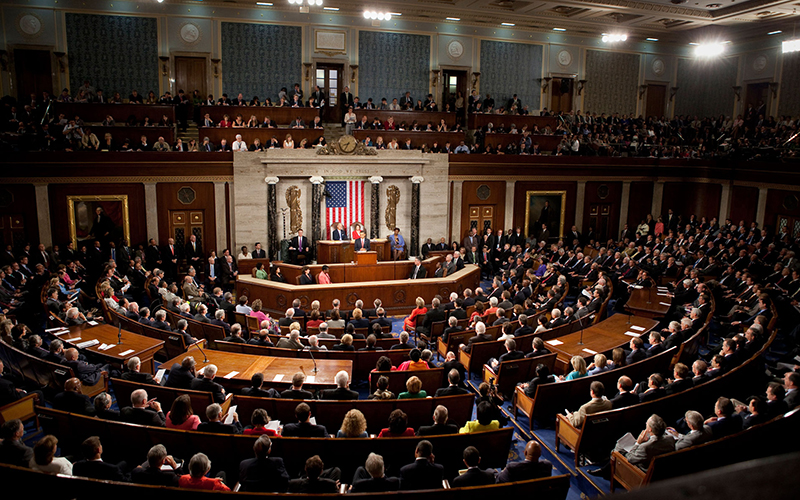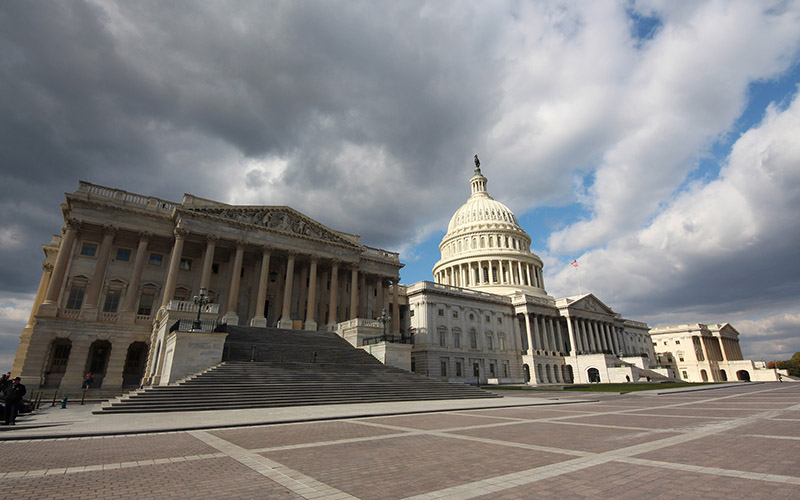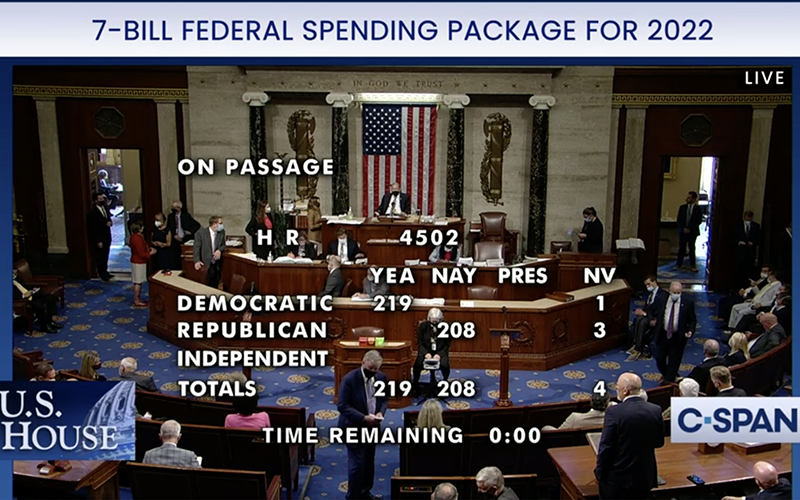
House members have cast more than 31,000 votes by proxy since the practice was first allowed in May 2020 as a COVID-19 emergency precaution. With COVID waning, some say it’s time to end the practice, which many say has been abused, but others see advantages to limited proxy voting going forward. (Photo by Lawrence Jackson/The White House)
WASHINGTON – Rep. Debbie Lesko, R-Peoria, does not think the House should continue to allow proxy voting as the pandemic winds down. But she also does not intend to pass up an opportunity that Democrats have seized.
So Lesko is among many Republicans – and many more Democrats – who have voted by proxy at least once since May 27, 2020.
“I don’t think we should have proxy voting, and I wish we didn’t have it,” Lesko said recently. “That being said, we do have it and so I have utilized it, but I would prefer it not be there and I really do believe that if and when the Republicans take back majority in the House, we will stop proxy voting.”
More than 31,000 proxy votes have been cast during more than 700 roll calls since absent members were first allowed to vote by proxy as an emergency COVID-19 safety measure, according to a Cronkite News analysis of almost two years of voting. They represent almost 10% of the more than 311,000 possible member votes in that time.
But what started as an emergency health measure has become a routine practice that some say is being abused.
During a recent House Rules Committee hearing on the issue, members told stories of members who voted while on vacation, while driving and, on at least one occasion, while on the deck of their boat. While some defend proxies as a way for members to stay closer to their constituents, critics say it can be used to stay closer to campaign donors, casting votes and then heading to fundraisers in the district.
“We have seen some members use proxy voting, and then publicly choose to do other things rather than voting on the floor,” said Molly Reynolds, a senior fellow of governance studies at the Brookings Institute.
“There’s stories about members going to fundraisers … and I think it undermines the public’s trust in the institution and it may contribute over time to this sense that Washington is a bad place, that Washington is a swamp,” she said.
Rep. Paul Gosar, R-Bullhead City, came under fire for voting by proxy while he attended the America First Political Action Committee gathering in Florida in February 2021, the same time that 13 other House Republicans used proxy voting to attend the Conservative Political Action Committee convention the same week.
Lesko trails Gosar slightly in the number of proxy votes, casting 95 to his 110 through the end of April. She can readily tick off the reasons for the times she has voted by proxy, all of which involve health concerns for herself or immediate family members.
While Republicans were initially antagonistic to proxy voting – the GOP leadership sued House Speaker Nancy Pelosi in a failed effort to stop it – they have become increasingly comfortable with the process. While only a handful cast proxy votes in 2020, their numbers have steadily risen, with nearly 150 Republicans now having voted by proxy at least once.
Democrats still use proxy voting far more than Republicans, however, with nearly 240 Democrats having voted by proxy at least once. Democrats account for all top 10 proxy voters, with Rep. Al Lawson, D-Fla., having cast 717 proxy votes, the most of any member. Arizona Reps. Ann Kirkpatrick and Raul Grijalva, both Tucson Democrats, ranked fifth and eighth on the all-time proxy voting list.
Over two years of proxy voting, there are few obvious trends except for the increase in Republican participation – and the fact that proxy voting appears to spike around weekends and holidays.
As the House nears the second anniversary of its proxy experiment, some say it’s time to do away with the practice – but others say that, in the 21st century, there’s no reason meetings and votes cannot be held virtually, as long as safeguards against abuse are in place.
Reynolds said there are several benefits to proxy voting beyond the pandemic that should be considered when deciding whether or not to end it.
“If we think about the future of proxy voting, we have seen some members be able to use proxy voting for reasons that are not directly and immediately tied to COVID, but are reasons why we might want someone to be able to participate remotely for a short period of time,” she said.
“So there are, for example, a couple of members of the House who have been able to vote by proxy for a couple of weeks after the birth of a child in their family,” Reynolds said.
During the March 17 Rules Committee hearing on the future of proxy voting, many Democrats suggested making it permanent, but with modifications to prevent the practice from being abused. Rep. Veronica Escobar, D-Texas, suggested that proxy votes could be treated like sick days.

The House side of the U.S. Capitol. The Senate has allowed for virtual hearings during the pandemic, but not proxy voting. (Photo courtesy Architect of the Capitol)
“If we create rules around this prospect, let’s say every member gets 20 proxy day votes, so that every member gets a certain number of days where they can proxy vote,” Escobar told the panel.
“If they want to spend those 20 days attending in-district events or saving it for sick days or saving it for special occasions that they know are coming up that year, that should be the members prerogative,” she said. “We should treat members like adults.”
But Reynolds said it can be difficult holding representatives to House rules, pointing to the number of Republican members who refused to wear masks on the floor or pass through a metal detector outside the chamber, both required by the House at one time or another.
“Figuring out how to enforce those standards of good behavior is hard for the House,” said Reynolds, who said the House “generally just doesn’t have great tools at its disposal for policing the everyday behavior of members.”
While the Senate has not allowed proxy voting, both the House and Senate have allowed members – and witnesses – to testify remotely as a COVID-19 precaution. The House debate on the future of proxy voting also touched on remote hearings, which supporters said has allowed for a broader range of witnesses if they are not burdened by the cost and hassle of traveling to Washington.
Initially approved as a short-term measure, proxy voting has repeatedly been extended by Pelosi, who cited advice from the House physician on the ongoing pandemic. The current extension runs through May 14. But critics note that the House has lifted its mask mandate for members and they argue that, with vaccines widely available and cases apparently on the decline, the proxy voting is no longer needed.
While the future of proxy voting remains unclear, Reynolds said it will depend on multiple factors, including increasing pressure to end COVID-19 prevention measures and the upcoming midterm elections.
“I wouldn’t be surprised if it continues to the end of the Congress” at the end of this year, Reynolds said. “I also wouldn’t be surprised if it ends at some point, if only because we see increasing pressure to return things to normal.”

